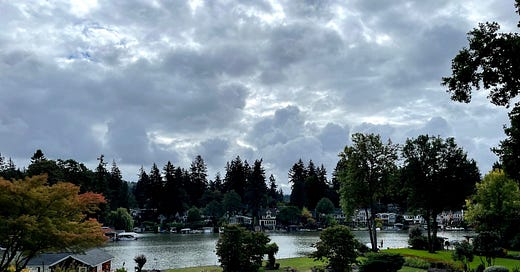Thinking Long-term
Today’s newsletter is a bit different. I’ve been trying to write twice a week and the bigger pieces I’m noodling on keep getting longer and more unwieldy so I thought I’d be a bit more stream of consciousness about what I’ve been pondering lately.
I started listening to Ezra Klein’s podcast with Richard Powers - author of The Overstory. I’m half way through the podcast and I can’t recommend it enough. Powers is a fascinating and wonderful human being and his journey, philosophy and perspective are mindful, insightful and inspiring.
In The Overstory, Powers writes a series of short stories about trees and our place among them. The short stories center on the notion that our lives are but blips in the natural cycle - the narratives are told in such a way that decades are often just paragraphs showing how evanescent our lives are. “This existence of ours is as transient as autumn clouds” to quote Buddha.
This podcast is another reminder about the change in perspective, and the value that comes from seeing in longer time horizons. Over the past two years I’ve started to “unlock” various parts of my life that I’ve wanted to do for many years before this and always failed previously. The main thing I missed was the importance of persistence - I kept wanting to change things in a matter of weeks or months which it turns out was not enough time to make a real difference. What I’ve witnessed in my own life is that there’s something magical that happens on the order of years - the slow drip of change accumulates to be transformative. This is most obvious in raising kids - the change from any particular day or week to the next is small, but on the order of years the changes are enormous.
This phenomena of long-term effort leading to big change is obvious when I write it, but is not the way most of the world around me operates. We live in a world where we want fast results - we goal in quarters, rarely in years. We humans want fast results and we grow tired of the tedium of repetition. There aren’t many books with titles like “how to get fit in 1000 days” or “learn how to cook in 10 years.” Our information ecosystem is also skewed to what is happening right now and towards what is unexpected (and usually bad) - there is very rarely news about long-running infrastructure projects which comes in on-time and under-budget after long steady effort.
All this to say that our entire collective consciousness is skewed towards the near term, and this skew influences our ambitions and the way we approach life.
The Long Now foundation is the main place I know that aims to think about this systemically - they want to think in really long time frames (hundreds and thousands of years). In this vein I listened to a podcast this week on how they’re studying the longest-lived organizations in the world to find commonalities - e.g., hotels, construction companies and universities that have been around hundreds of years.
While I think the Long Now is extremely lofty and interesting, my mind goes not to hundreds of years but to something much shorter: How many efforts around us have even a 5 year time horizon? 10? 20? What would it mean to think in this way?
I recall someone (maybe Elon Musk?) once talking about how there is a misperception that attempting big, difficult projects is harder than smaller goals. I recall this person saying these big audacious problems are actually easier because there is no competition. I think this insight is related to long term thinking: if everyone has a short-term time horizon, those with a longer view and the corresponding funding and will have an advantage. Others can’t even see they are missing this change in perspective - it’s cultural myopia.
And so I leave you with these thoughts: What have you tried to do that didn’t work but might if you gave it a longer time horizon? What would you attempt to accomplish that could only be done in 3, 5, 10 years, if you knew that you’d succeed?
Photo for the thumbnail: Lake in the suburbs of Portland, Oregon.




